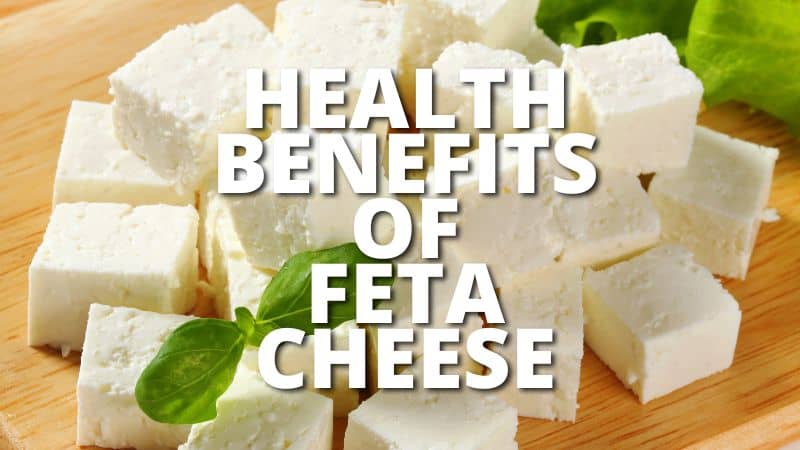Feta cheese is a delicious, crumbly cheese traditionally made from sheep’s milk or a mixture of sheep and goat milk.
Originating from Greece, it has become a worldwide favorite due to its distinct flavor and nutritional richness.
People commonly add feta to salads, sandwiches, pizzas, and pasta dishes.
Beyond taste, feta cheese offers numerous health advantages that make it a beneficial addition to a balanced diet.
Understanding these benefits can guide you in making healthy eating choices.
1. Strengthening Bones with Calcium and Protein
Feta cheese is a good source of calcium, which your body needs to build and keep strong bones and teeth.
A single serving of feta gives you about 140 milligrams of calcium, helping you meet your daily needs.
This cheese made from sheep’s milk or sometimes a mix that includes goat cheese also contains protein that helps repair and grow bone tissue.
Both calcium and protein play a key role in supporting long-term bone health.
Eating one serving of feta a few times a week may help lower the risk of weak bones, fractures, or osteoporosis as you age.
Since feta is soft, salty, and easy to use, you can add it to salads, eggs, or whole-grain toast.
Including cheese made with goat milk in your diet is a simple way to support your bones while enjoying flavorful food.
📙 Potential Health Benefits Of Gir Cow Milk
2. Supporting Digestive Health Through Probiotics
Feta cheese contains probiotics, beneficial bacteria that enhance digestion and support overall gut health.
These helpful bacteria balance your gut flora, minimizing digestive problems such as bloating, gas, and diarrhea.
Consuming probiotic-rich foods like feta can boost your body’s digestive efficiency.
A healthy digestive system can also lead to improved immunity and overall well-being.
Making feta cheese a regular part of your diet can greatly benefit your digestive health.
📙 Potential Health Benefits Of Camel Milk
3. Managing Weight with CLA in Feta Cheese
Feta cheese naturally includes conjugated linoleic acid (CLA), a type of healthy fat associated with weight management.
Research suggests that CLA helps reduce body fat while increasing lean muscle mass.
Because feta cheese is relatively low in calories compared to other cheeses, it easily fits into calorie-conscious diets.
Eating feta regularly may support your weight management goals without sacrificing flavor.
Including feta in balanced meals can assist you in maintaining a healthy weight.
📙 Potential Health Benefits Of Paneer
4. Enhancing Immunity with Zinc and Selenium
Feta cheese provides essential minerals like zinc and selenium, which strengthen your immune system.
Zinc plays a critical role in helping your body fight off infections and recover from illnesses.
Selenium acts as an antioxidant, protecting cells from harmful substances and reducing inflammation.
Consuming feta cheese regularly can fortify your body’s natural defenses.
Adding feta to your diet can help keep you healthy and resistant to common illnesses.
📙 Potential Health Benefits Of Camembert Cheese

5. Promoting Eye Health with Omega-3 Fatty Acids
Omega-3 fatty acids, found in feta cheese, contribute positively to maintaining good eye health.
These beneficial fats help reduce eye inflammation and can prevent vision problems like age-related macular degeneration and dryness.
Regularly consuming foods rich in omega-3 fatty acids supports clear and healthy vision over time.
Including feta cheese in your diet is an easy way to enhance long-term eye health.
Eating feta can thus be a tasty way to protect your eyesight.
📙 Potential Health Benefits Of Laban
6. A Suitable Cheese for Those Sensitive to Lactose
Compared to many other dairy products, feta cheese has significantly lower lactose levels, making it more digestible for people with lactose intolerance.
Individuals who usually avoid cheese due to digestive discomfort may find feta cheese easier on the stomach.
The fermentation process involved in making feta reduces its lactose content further.
Many lactose-sensitive people can comfortably include feta cheese in their diet without discomfort.
Thus, feta cheese offers an accessible option for enjoying dairy.
📙 Potential Health Benefits Of Blue Cheese
7. Improving Brain Function and Energy with Vitamin B12
Feta cheese is an excellent source of vitamin B12, essential for healthy brain function and sustaining energy levels.
Vitamin B12 supports clear thinking, memory, and concentration by maintaining healthy nerve cells and proper blood circulation.
Insufficient vitamin B12 can cause fatigue, confusion, and memory issues.
Regularly eating feta cheese can help maintain adequate B12 levels, reducing these health risks.
Incorporating feta into your diet may enhance both your cognitive abilities and physical energy.
📙 How Different Dairies Enhance Your Well-Being
8. Maintaining Heart Health by Balancing Cholesterol
Feta cheese is a type of cheese that contains both saturated fat and unsaturated fat, which play different roles in heart health.
While too much saturated fat can raise bad LDL cholesterol, the unsaturated fats in feta may help raise good HDL cholesterol.
This balance can support healthier cholesterol levels when eaten in small amounts.
However, feta is also high in sodium, which can raise blood pressure if eaten too often or in large portions.
Because of this, it’s important to enjoy feta in moderation as part of a balanced diet.
Using small amounts of feta on salads or vegetables is one way to add flavor without too much salt or fat.
When eaten this way, this type of cheese can fit into a heart-healthy eating plan that helps lower the risk of heart disease.
📙 Wonderful Wellness Advantages
9. Preventing Anemia by Improving Iron Absorption
Feta cheese includes nutrients that enhance your body’s ability to absorb iron from other foods, reducing the risk of anemia.
Iron is crucial for transporting oxygen to various parts of your body, which helps prevent fatigue and weakness.
Better iron absorption means your body utilizes dietary iron more effectively.
Combining feta cheese with iron-rich meals significantly boosts your iron intake and overall blood health.
Regular consumption of feta cheese can support your fight against iron deficiency anemia.
10. Controlling Appetite and Weight with Protein-Rich Feta
The high protein content in feta cheese helps promote feelings of fullness and reduces hunger between meals.
Eating protein-rich foods like feta can help curb cravings and limit unnecessary snacking.
Including feta cheese in your meals makes it easier to maintain portion control, aiding in weight management.
This nutritional quality makes feta particularly useful for those focused on weight loss or weight maintenance.
Regularly consuming feta cheese can thus contribute positively to maintaining healthy eating habits.
💡 Conclusion
Incorporating feta cheese into your diet offers numerous health benefits, including stronger bones, improved digestion, enhanced immunity, and better heart health.
Its distinctive nutrient composition makes it suitable for a variety of dietary needs and preferences.
With moderate consumption, feta cheese can provide these health advantages without excess calorie intake.
Regularly enjoying feta cheese in your meals is an enjoyable way to boost your health.
Make feta cheese a flavorful addition to your balanced and nutritious diet.
⛑️ Safety First
Feta cheese may have some health benefits, but these are only possible benefits, not guaranteed.
Some claims are based on personal stories or early research, not strong proof.
People who are pregnant, allergic to dairy, or have high salt needs should avoid or limit feta.
Talk to your doctor before adding it to your diet.
It’s also a good idea to do your own research and ask a health expert.
⚠️ Content Disclaimer
This article is not medical advice.
It is for general information and may also be seen as entertainment.
Always talk to a doctor or health expert before making changes to your diet or health routine.
The facts here may not be complete or up to date.
Use this article as a starting point, not a final answer.

